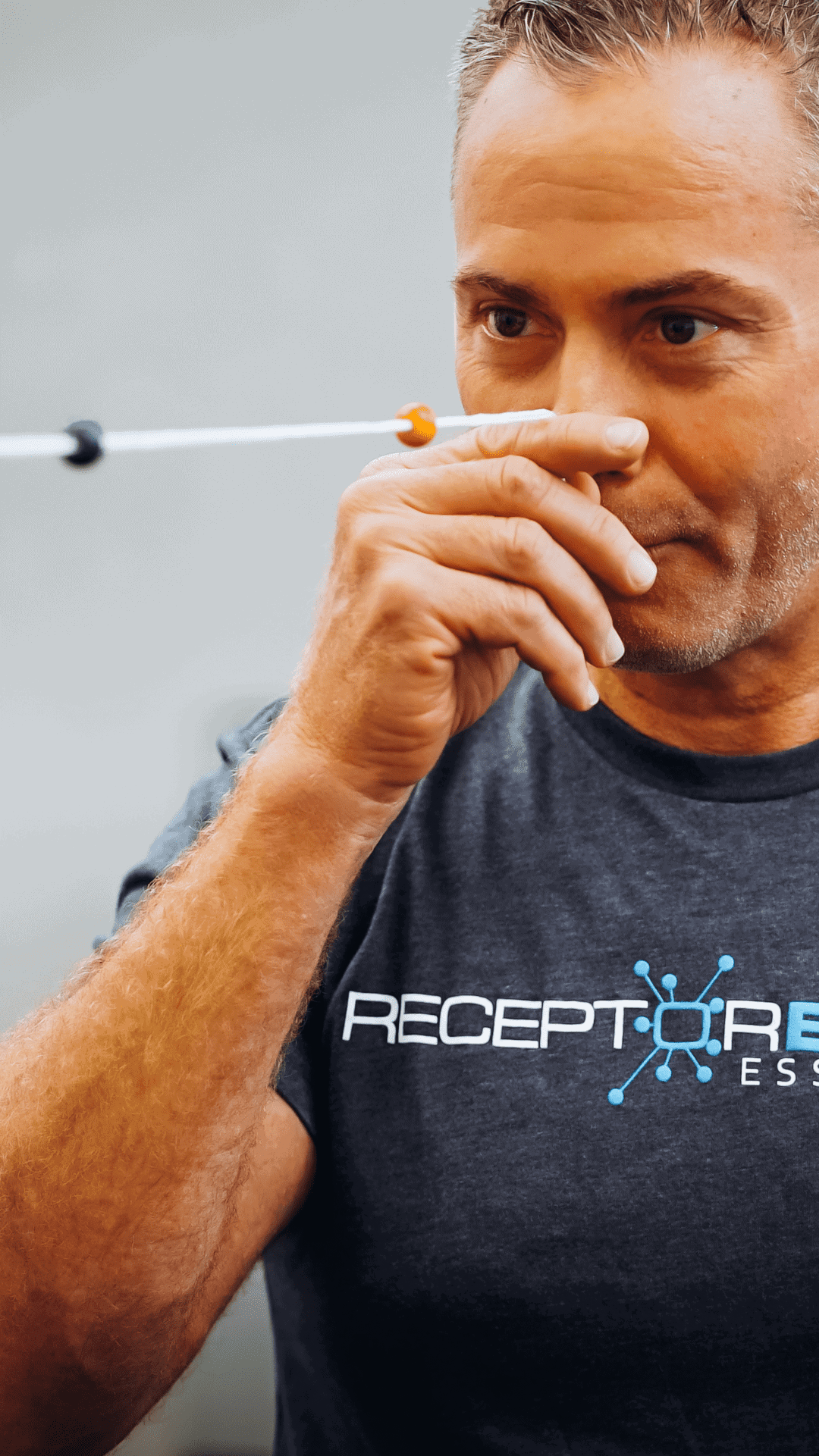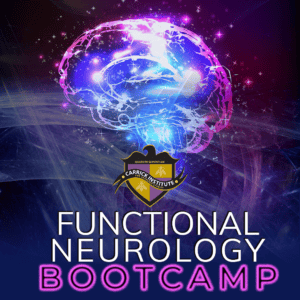12 DAYS OF NEURO SAVINGS
Day 5 - Christmas Bootcamp Day
Save 25% Off all Bootcamp Courses. Available Via Online, Self-Paced Learning, and In Person!
Bootcamp courses:
- Concussion Bootcamp
- Dysautonomia Bootcamp
- Vestibular Bootcamp
- Functional Neurology Bootcamp
- Clinical Neuroscience Bootcamp

Functional Neurology Bootcamp
If you have been curious about Functional Neurology and didn’t know where to begin, this program is for you. This 2-day program gives you an excellent introduction to the Functional Neurology paradigm in healthcare.
Attending clinicians will learn refined neurology and physical examination skills and a brain-based treatment model for optimizing the nervous system for improving human function. If your patients have nervous systems, adding Functional Neurology will supercharge your clinical outcomes!
Functional Neurology Introduction
What Is Functional Neurology?
Functional neurology represents a paradigm of healthcare that utilizes an evidence-based approach to quantify nervous system function and to understand how nervous system dysfunction contributes to various disease processes.
It offers a conceptualized understanding of the human nervous system as an integrated network that controls the body’s homeostasis through balanced neuronal firing.
It is founded on the principle of neuroplasticity, in that nerve connections in the brain may be modified or shaped by various afferents, including sensory, cognitive, emotional, or motor experiences, thus amenable to rehabilitation.
What is Functional Neurology Used For?
Since the nervous system is the governing system of the body, Functional Neurology can be applied to any disease or disorder of the human form where neurology is involved (which is most conditions!). Using the Functional Neurology approach will also allow clinicians to gain valuable insights into how their care affects the nervous system. This allows clinicians to make better-informed decisions about what approaches may work best for a particular patient and their presentation.

Scholars Will Learn
- Learn the model of Functional Neurology in healthcare.
- How to apply the fundamental concepts in Functional Neurology to optimize your patient’s nervous system function.
- How to leverage neuroscience to combat chronic pain
- How understanding Neuron Theory changes your treatment approach.
- How Transneuronal Degeneration & Diaschisis Influence Nervous System Optimization
- How to apply the 3 Pillars of Nervous System Optimization.
- What it means to take a “Brain-Based Approach” and how to target specific regions of the nervous system.
- How to use the chief complaint to localize areas of brain dysfunction.
- The Good & Bad of Neuronal Plasticity
- Clinical Applications- How to leverage the Five domains of Nervous System Optimization
- Visual, Vestibular, Somatosensory, Cognitive & Autonomic
What Will You Be Able To Do After Completing This Program
- Results – Leverage your understanding of Functional Neurology to achieve better patient outcomes.
- Exam techniques – Examine your patient to determine the area of nervous system decompensation and which domain of nervous system optimization to focus on.
- Treatment certainty – Decide which therapeutic tool is best warranted for a patient’s condition.
- Measure how your treatment approach impacts nervous system function and adjust that approach to maximize outcomes if needed.
Who is this class for?

This program is designed for those looking for a practical introduction to the paradigm of Functional Neurology in healthcare..
The healthcare professionals that can attend this program are MD, DC, DO, PT, OT, ATC, LMT, ND, LAc, PA, NP, and CA (If accompanied by DC).
Functional Neurology Bootcamp Course Objectives
Why Target the Brain?
- The brain represents the central governing system of the body.
- By affecting this system, you can affect the entire body.
- What targets could a practitioner use, as these targets differ with various approaches? (7 Longitudinal Levels of The Lesion)
- End Organ
- Peripheral Nerve
- Spinal Cord
- Cerebellum
- Brainstem
- Thalamus
- Cortex
- Just because the approach to the target may differ does not make that approach any better or worse than another.
- Functional Neurology allows you to choose the best target to approach and the best approach to that target.
Discuss what it means to take a brain-based approach.
- Start With a Patient Example
- A patient has Neck Pain
- Each practitioner will theorize a different target as a nidus to the problem and treat it to reduce pain.
- They will assume that what they treated in the periphery was the nidus, which yielded an improved outcome. However, another practitioner may take a different approach. Treat another region and achieve positive results while assuming that what they treated was the causative nidus.
- Chiropractor: Subluxation
- PT: Intersegmental Joint Dysfunction and muscle asymmetry.
- Acupuncture: Chi Imbalance
- Nucha Practitioner: Atlas Subluxation
- But all of these are governed by the nervous system, which is governed by the brain.
- Thus, the only way all these approaches could work is if they all affected Brain Function simultaneously; the change in brain activity was responsible for the patient’s symptoms in the first place.
- Using Functional Neuro is not replacing your technique but fortifying it and allowing you to make better decisions to help your patient.
- Bring in what all the causes could be.
- Subluxation muscle tension
- Eye problem
- Vestibular Imbalance
- Basal Ganglia produces dystonia.
- We must look at the vestibular system for an answer and how it attempts to fix imbalances.
- Looking at UVL, the muscular reaction substitutes for the loss by increasing muscle tone in the plane of the asymmetry. Thus, subluxation can sometimes be viewed as a way for the brain to try to fix its asymmetry.
- Subluxations/fixations can, in one way, be viewed as segmental dystonia that is secondary to brain dysfunction.
- Taking a brain-based approach suggests that some subluxations exist to reduce brain asymmetry and thus should not be addressed while others do. Understanding that and differentiating the two is invaluable in treating chronic conditions.
- Some clinicians would say that all manual therapies affect the brain, so they assume they are taking a brain-based approach. The difference between that statement and functional neurology lies in Target Specificity, Target Outcome, and what you are trying to accomplish. Without a target, it isn’t easy to aim.
- Are you trying to upregulate the target or downregulate it?
- Are you trying to create positive or negative plasticity?
Course Information
Included In Your Tuition
15 Neurology Hours & Training
All-Access to the digital recording of the class
All-Access to the flipped classroom material and online videos, including updates. The clinical applications will be organized and updated so you can easily find them, review them, and implement them in practice.
Receive any future updates to the course videos or other materials
Re-attendance – Retake the class on-site, via Livestream, or via online, self-paced learning as many times as you’d like as an audit.*
For more information on CE/CME eligibility, visit https://carrickinstitute.com/ceinfo/
Re-attendance policy: Scholars who have registered and completed the program have the ability to re-attend the course with no additional fee. When re-attending a course, the scholar will not receive continuing education credits and will receive an audit. Carrick Institute is not responsible for providing new materials for class audits, including but not limited to manuals, shirts, equipment, etc. If manuals have been updated since the original attendance date, the updated materials will be available via PDF on the scholar’s online portal. If the scholar would like to purchase a new paper manual, they may do so before the course start date.
The All-access and re-attendance as part of your tuition are specific to the this program. The re-attendance is considered an audit of the course material and does not yield CE or CEU credits. It does transfer to other programs offered by the Carrick Institute.
To view full Terms & Conditions, click here.
For more information on CE/CME eligibility, visit https://carrickinstitute.com/ceinfo/
Continuing Education
Continuing education requirements to maintain certification status through a professional association are usually separate from the state board’s requirements. In order to maintain your certification status in your state please submit a State Continuing Education Application Form.
*We cannot guarantee approval for individual state CEUS. Each state has different rules and regulations. State Applications need to be submitted at least 90 days prior to the state date of your course*
Recertification / Diplomate Requirements: All Carrick Institute courses are approved by the ACFN & ACNB.
Get Started
JOIN US ONLINE OR AT ONE OF THE LIVE LOCATIONS LISTED BELOW!
Upcoming Course Dates
HOTEL / VENUE INFORMATION
REGISTER HERE
-
Functional Neurology Bootcamp (108)
$699.00 Select options This product has multiple variants. The options may be chosen on the product page




